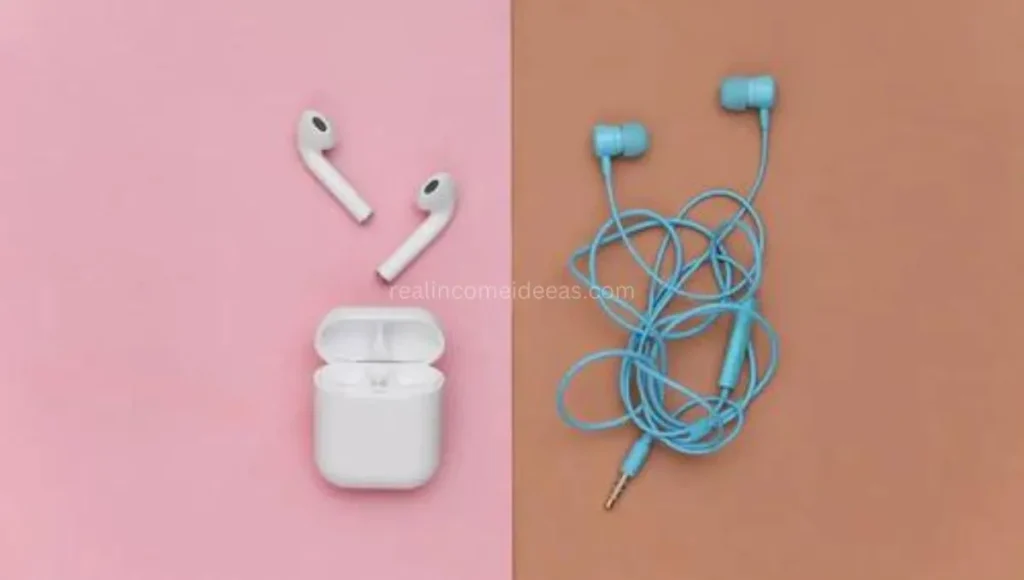Do you ever feel like your headphones are getting in the way of your workout routine? Are you tired of constantly repositioning and adjusting them to stay secure?
The debate over wireless versus wired headphones for working out is still on-going, but the right choice can make a significant difference in your workout experience.

It is not just about sound quality or freedom of movement. Different types of headphones come with their unique sets of benefits and concerns that could impact your workout performance.
And as fitness enthusiasts, we understand how crucial it is to make the right choice for an uninterrupted exercise session.
We will cover everything you need to know to choose between wireless and wired headphones for working out. We will discuss the features, benefits, and concerns of each type of headphone, so you can make an informed decision and enjoy a stress-free workout session.
Wired Headphones
Wired headphones, also known as traditional headphones, are popular with many music and audio enthusiasts. They are designed to be connected to a device using a cable that transmits the audio signals from the device to the headphones.
The cable contains two channels, one for the left ear and one for the right ear, which carry analog signals that recreate the sound from the sources.
How do Wired Headphones Work?
Working principle behind wired headphones is quite simple yet efficient. When you plug them into an audio source, whether a smartphone, computer, or music player, the audio signals are transmitted through the cable and into the headphones.
Once they reach the headphones, the signals are converted into sound waves by the drivers, which are the loudspeakers inside the earcups or earbuds. The drivers consist of a magnet, a voice coil, and a diaphragm, which work together to produce high-quality audio output.
Also, the design of the earcups or earbuds helps to seal in the sound, which provides a more immersive listening experience and prevents audio leakage to the surrounding environment.
Benefits of Wired Headphones
There are several benefits of wired headphones that make them the preferred choice for a lot of users.
Audio Quality
One of the biggest advantages of wired headphones is their superior audio quality. Wired headphones provide significantly better sound quality than wireless headphones as they don’t experience signal loss or data compression, resulting in more depth, clarity, and a larger frequency range. This is an important consideration for serious audiophiles who prioritize high-quality sound over convenience.
Connectivity
Connectivity is a significant concern with wireless headphones, but with wired headphones, users face no connectivity issues. Once you connect wired headphones, there are no signal dropouts, disruptions, or pairing issues to be concerned about.
As such, wired headphones provide stable and uninterrupted audio output, thereby allowing users to enjoy seamless audio quality without interruption.
Battery Life
Battery life is not a problem with wired headphones as they don’t rely on power cells to operate. This means that users don’t have to worry about battery levels or take breaks to recharge their headsets, which can be a significant inconvenience during long workout sessions.
Cost
Also, wired headphones are more pocket-friendly than wireless headphones since they require fewer components to manufacture, making them more affordable. They are also more durable and less susceptible to accidental falls or damage since they lack delicate, complicated wireless components.
Wired headphones offer a reliable and cost-effective option for users who prioritize audio quality over convenience. They provide consistent audio quality, with no connectivity issues, battery concerns, or cable interference that might interrupt a workout.
Cons of Wired Headphones
Lack of mobility
Cable limits your movement and can be a hassle to untangle or manage, especially when exercising or on the go. Also, the cable can get damaged or wear out over time, requiring you to replace the entire set of headphones.
Compatibility
Most new smartphones and laptops do not have a unified headphone jack, requiring users to purchase an adapter or use wireless headphones instead. This can be a deal breaker for some users who prefer wired headphones for their sound quality.
Less durable
Wired headphones can be less durable than their wireless counterparts. With a cord, there Is more chance of damage from accidental pulls, bends or twists. The cable may also fray over time and break, rendering the headphones unusable.
Not waterproof
Many wired headphones are not waterproof, meaning you can’t use them in the rain or while sweating during workouts. This can be a significant disadvantage, particularly for people who like to listen to music while exercising outdoors.
Wireless Headphones
Wireless headphones are a modern and practical innovation that has become increasingly popular in recent years. They are headphones without any cords or cables, allowing users to be free from tangled wires and to make the most of their portable devices.
Wireless headphones come in different styles, including over-ear, on-ear, and in-ear, and can be used for various applications such as listening to music, podcasting, phone calls, and gaming.
How Do Wireless Headphones Work?
Wireless headphones function by utilizing radio frequency, infrared or Bluetooth technology to transmit audio signals without the need for wires.
These headphones possess an in-built receiver that picks up the signal, decodes it, and converts it into sound waves that are then played through the headphones.
Furthermore, wireless headphones are equipped with a rechargeable battery that powers the internal electronics and amplifiers that convert the audio signal into sound.
Benefits of Wireless Headphones
As someone who’s an avid fitness enthusiast, I can attest to the appeal of wireless headphones. The benefits of wireless headphones are numerous
Freedom of Movement
Starting with the unrestricted freedom of movement they offer. With no cords or cables attached, exercise activities like running, jumping or lifting weights become a breeze, and you can focus solely on your workout.
Comfort
Comfort is an essential aspect when it comes to any headphones, especially while working out. Wireless headphones extensively use materials like silicone and memory foam to mold ear cup sizes and shapes that work for most ear shapes and different head sizes. This feature also eliminates the discomfort of having to deal with loose cables and additional accessories during a workout.
Multi-Device Connectivity
Another advantage of wireless headphones is their multi-device connectivity option. This feature allows users to connect with multiple devices simultaneously, including smartphones, laptops, or tablets, without repeatedly disconnecting and reconnecting to switch between devices.
As someone who regularly uses headphones on flights, this feature has saved me considerable time and effort.
Cons of Wireless Headphones
Sound Quality
Sound quality of wireless headphones may not be as good as wired headphones. This is because the audio signal has to be compressed to be transmitted wirelessly, which can result in some loss of sound quality.
Battery Life
Wireless headphones are powered by batteries, which means that they need to be recharged regularly. The battery life of wireless headphones can vary greatly, with some models only lasting a few hours before needing to be recharged.
Connection Drops
Wireless headphones can experience connection drops, which can be frustrating for the user. This can happen if the headphones are not in range of the device they are connected to, or if there is interference from other wireless devices.
Price
Wireless headphones tend to be more expensive than their wired counterparts. This is because they require additional technology to enable them to work wirelessly.
Wired vs Wireless Headphones: Which is Better?
About the question of wireless headphones or wired headphones which is better? The answer to this question depends on your personal preferences and needs. If you prioritize sound quality and reliability, wired headphones are the way to go.

However, if you need headphones that can be used anywhere and offer greater freedom of movement, that means you should consider the flexibility of headphones that are wired and wireless, then wireless headphones are a better choice.
FAQS
Q. Are wired headphones safer than wireless?
However, the levels of radiation emitted by both wired or wireless headphones are generally considered to be very low and are unlikely to cause any harm to the human body.
On the contrary, wireless headphones give more freedom to move around while improper wire management of wired headphones, especially if they are entangled when you are walking and driving can pose potential safety risks.
Q. Is wired better than wireless for gaming?
Final Thoughts
Choosing the best headphones for your workout routine is no longer just a choice between wired and wireless models. While both offer different benefits and drawbacks, newer innovations in the industry have brought more versatile options like true wireless earbuds, which offer the best of both worlds.
However, comfort, durability, and sound quality should still be top priorities when selecting the ideal headphones for your needs.
Consider factors like the length and intensity of your workouts, the type of exercises you do, and whether you may need to use your headphones for other activities like commuting or multitasking during work.
With enough research and experimentation, you just might find the perfect pair of headphones that will motivate and drive you to reach your fitness goals using your favorite tunes.
Now that you have all this information, we’d like to ask you, which type of headphones do you prefer for working out and why?




